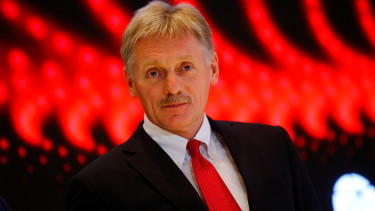We may be heading for another major financial crisis - Soros warns
Refugee crisis
“The European Union is in an existential crisis. Everything that could go wrong has gone wrong," Soros kicked off his speech.“It is no longer a figure of speech to say that Europe is in existential danger; it is the harsh reality. [...] Europe needs to do something drastic to escape it. It needs to reinvent itself," he has warned.
In his view, Europe faces three pressing problems:
- the refugee crisis;
- territorial disintegrations as exemplified by Brexit; and
- the austerity policy that has hindered Europe’s economic development.
Addressing the refugee crisis of 2015, Soros noted that at first most people sympathized with the plight of refugees fleeing from political repression or civil war, “but they didn’t want their everyday lives disrupted by a breakdown of social services. They were also disappointed by the failure of the authorities to cope with the crisis."
Indeed the whole of Europe has been disrupted by the refugee crisis.
Unscrupulous leaders have exploited it even in countries that have accepted hardly any refugees. In Hungary, Viktor Orbán based his reelection campaign on falsely accusing me of planning to flood Europe, Hungary included, with Muslim refugees
, said SorosOrbán is now
posing as the defender of his version of a Christian Europe that is challenging the values on which the European Union was founded. He is trying to take over the leadership of the Christian Democratic parties, which form the majority in the European Parliament."
Soros stressed that he has always advocated that the allocation of refugees within Europe should be entirely voluntary.“Member states should not be forced to accept refugees they don’t want and refugees should not be forced to settle in countries where they don’t want to go."
What can be done to save Europe?
Soros believes that the voluntary principle ought to guide Europe’s migration policy. Europe must also urgently reform or repeal the so-called Dublin Regulations which have put an unfair burden on Italy and other Mediterranean countries with disastrous political consequences, he said.“The EU must protect its external borders but keep them open for lawful migrants. Member states in turn must not close their internal borders."
“The idea of a “fortress Europe" closed to political refugees and economic migrants alike violates both European and international law and, in any case, it is totally unrealistic."Europe wants to extend a helping hand towards Africa (and other parts of the developing world) by offering substantial assistance to democratically inclined regimes, Soros said. He thinks this would enable them to provide education and employment to their citizens. They would be less likely to leave and those who did would not qualify as refugees.
“At the same time, European countries could welcome migrants from these and other countries to meet their economic needs through an orderly process. In this way migration would be voluntary both on the part of the migrants and the receiving states."
“ Such a “Marshall Plan" would also help to reduce the number of political refugees by strengthening democratic regimes in the developing world."
He estimates that a meaningful Marshall Plan for Africa would require at least 30 billion euros a year for a number of years. Member states could contribute only a small fraction of this amount even if they were ready to do so, Soros added.The financier said that is what has led him to put forward an out-of-the-box proposal for financing it. He did not go into the details, but pointed out that
“the proposal contains an ingenious device that would enable the European Union to borrow from the market at a very advantageous rate without incurring a direct obligation for itself or for its member states."

He also noted that although it is an out-of-the-box proposal, it has already been successfully used in other contexts, mainly in general revenue municipal bonds in the US and also in surge funding for infectious diseases.
Multi-track Europe instead of a multi-speed Europe!
“Now we need a collaborative effort that combines the top-down approach of the European institutions with the bottom-up initiatives that are necessary to engage the electorate," Soros said. He praised French President Emmanuel Macron’s proposal (what he calls Citizens’ Consultations), which initiative, Soros said, “needs to be a genuinely grassroots effort."He noted that there is a hidden assumption at work here, namely that various member states may be moving at different speeds but they are allheading to the same destination. This has given rise to the claim of “an ever-closer union" that has been explicitly rejected by a number of countries.
This claim must be abandoned. Instead of a multi-speed Europe we should aim at a “multi-track Europe" that would allow member states a wider variety of choices. This would have a far-reaching beneficial effect.
“Right now, attitudes towards cooperation are negative: member states want to reassert their sovereignty rather than surrender more of it. But if cooperation produced positive results, attitudes may improve and some objectives, like defense, that are currently best pursued by coalitions of the willing may qualify for universal participation," he added.New crisis threatens?
The written version of his speech was published in full on the website of Project Syndicate, as well.He writes that it’s important to recognise tha the refugee crisis is a European problem requiring a European solution.
“The EU has a high credit rating, and its borrowing capacity is largely unused. When should that capacity be put to use if not in an existential crisis? Historically, national debt always grew in times of war. Admittedly, adding to the national debt runs counter to the prevailing orthodoxy that advocates austerity; but austerity is itself a contributing factor to the crisis in which Europe finds itself."
Until recently, Soros added, it could have been argued that austerity is working: the European economy is slowly improving, and Europe must simply persevere.
“But, looking ahead, Europe now faces the collapse of the Iran nuclear deal and the destruction of the transatlantic alliance, which is bound to have a negative effect on its economy and cause other dislocations. The strength of the dollar is already precipitating a flight from emerging-market currencies."
We may be heading for another major financial crisis. The economic stimulus of a Marshall Plan for Africa and other parts of the developing world should kick in just at the right time.
Brexit
Brexit is an immensely damaging process, but a lose-lose proposition could be converted into a win-win situation
, Soros writes.He thinks divorce will be a long process, probably taking more than five years - a seeming eternity in politics, especially in revolutionary times like the present.
“Ultimately, it is up to the British people to decide what they want to do, but it would be better if they came to a decision sooner rather than later."
That is the goal of an initiative called Best for Britain, which Soros also supports, and which fought for, and helped to win, a meaningful parliamentary vote on a measure that includes the option of not leaving before Brexit is finalised.
“Britain would render Europe a great service by rescinding Brexit and not creating a hard-to-fill hole in the European budget. But its citizens must express support by a convincing margin in order to be taken seriously by Europe. That is Best for Britain's aim in engaging the electorate."





